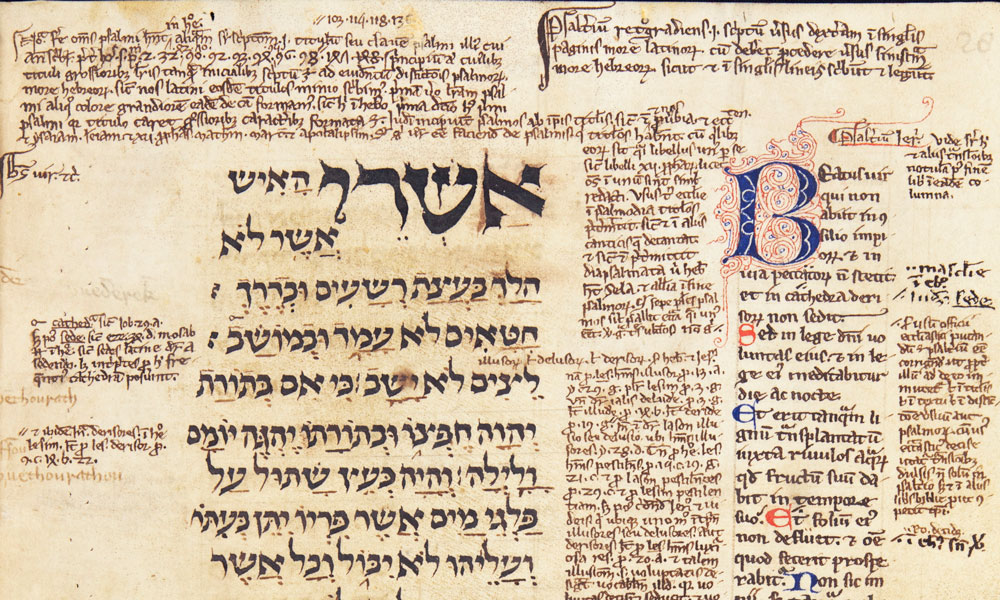Visitors to Washington, D.C.’s Folger Shakespeare Library during the last few months have had the rare opportunity to view a special exhibition of 50 manuscripts and early printed books from the celebrated Library of Corpus Christi College, Oxford. Organized to mark the college’s 500th anniversary, the show features what has been called “the most important collection of Anglo-Jewish manuscripts in the world.” These works, from the 12th and 13th centuries, include a series of volumes that were apparently commissioned from Jews by Christian scholars to facilitate learning Hebrew and studying biblical texts in their original language. Other volumes in this collection include commentaries by the 11th-century French rabbi known as Rashi and what is believed to be the oldest surviving Ashkenazi prayer book.
The exhibit also features a 15th-century manuscript of Chaucer’s The Canterbury Tales, a 14th-century manuscript of the Middle English narrative poem Piers Plowman and a 15th-century manuscript of Homer’s Iliad, in Greek, with unusual red-orange designs attributed to the scribe Ioannes Rhosos of Crete. A final section showcases works of early science, among them a letter from Sir Isaac Newton with observations on what is now known as Halley’s Comet and a printed volume with drawings of Galileo’s first observation of the surface of the moon.

A page from a 13th-century parchment manuscript of the biblical books of Proverbs and Psalms depicts the start of Psalms in parallel columns of Hebrew and Latin; the marginal notes are in Latin. © Corpus Christi College, Oxford
The first Renaissance college at Oxford and one of the oldest of the 38 self-governing colleges at the modern University of Oxford, Corpus Christi was founded in 1517 by Richard Fox, Bishop of Winchester and adviser to Henry VII and Henry VIII. Its mission was to pursue humanist ideals of scholarship in three languages—not just Latin, but also Greek and Hebrew—along with such subjects as astronomy, mathematics, medicine and philosophy. When Bishop Fox founded Corpus Christi College, says exhibition curator Peter Kidd, he wanted the college to be “part of the new intellectual current spreading across Europe.”
The Library is not open to the general public. The most delicate items in its collection, in fact, are kept in acid-free boxes in underground vaults, where scholars are allowed access to them under supervision. The extraordinary works in this exhibition are rarely seen, and this is their first time in America. About 80 to 90 percent of the show, says curator Kidd, is from the Library’s first century, acquired between 1517 and 1611. Many of these initial items were obtained from Bishop Fox and from John Claymond, Corpus Christi’s first president.
Among Claymond’s contributions is a printed 1497 book of the letters of St. Jerome, who translated the Bible into Latin. In it, a woodcut designed by Albrecht Dürer depicts the 4th-century saint removing a thorn from a lion’s paw; behind him are three open books displaying the first words of Genesis in Greek, Hebrew and Latin. (St. Jerome used the original languages, Hebrew and Greek, in creating his new Latin version of the Bible.) Claymond also gave the college the important collection of Hebrew manuscripts, all of which were written before 1290, when Jews were expelled from England. Curator Kidd says that these manuscripts are “probably culturally the most significant…a unique survival.”
For those who missed the exhibition at the Folger, “500 Years of Treasures from Oxford” will be on view at the Yeshiva University Museum at New York City’s Center for Jewish History (15 West 16th Street) from May 14 to August 6.



